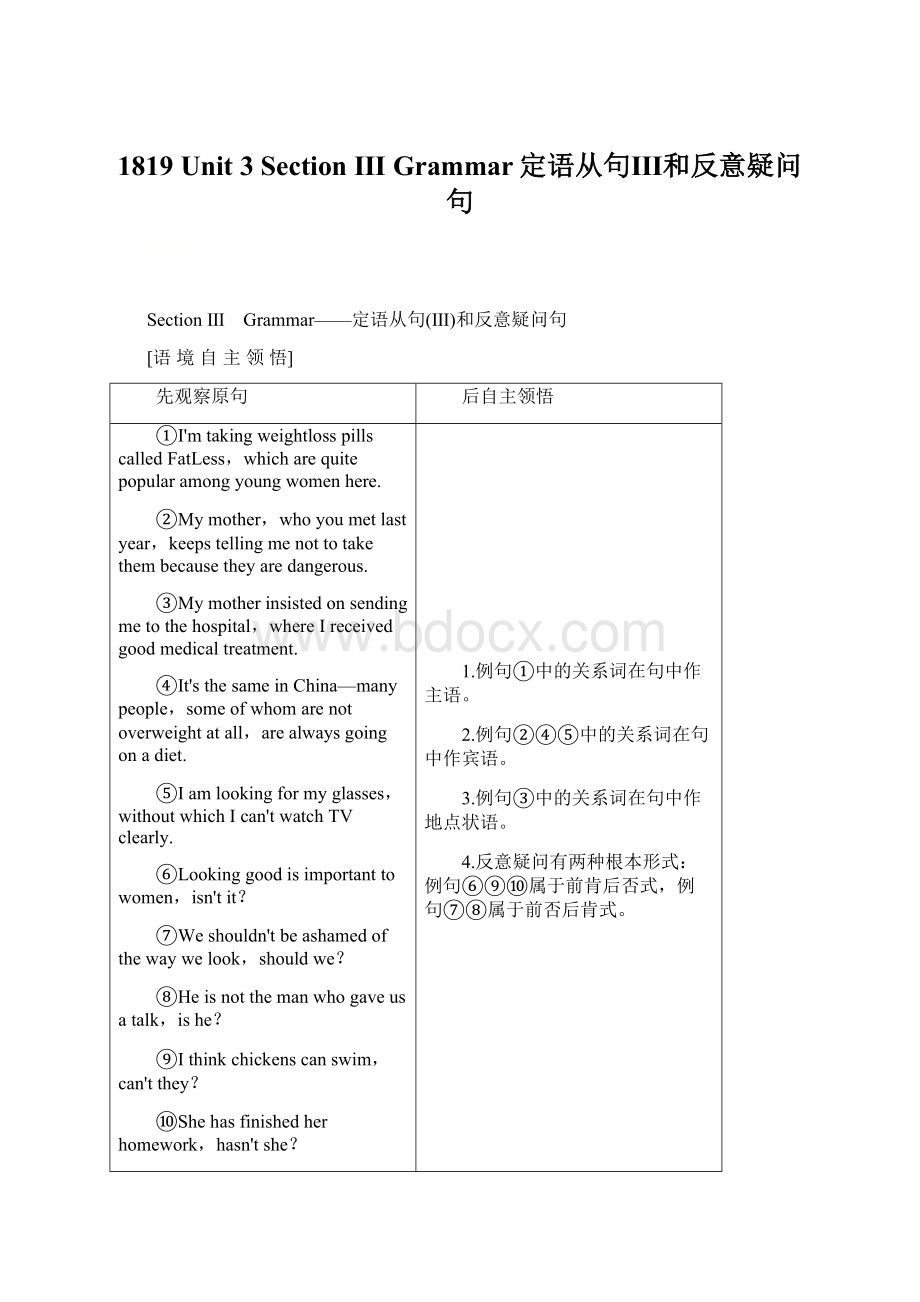 1819 Unit 3 Section Ⅲ Grammar定语从句Ⅲ和反意疑问句.docx
1819 Unit 3 Section Ⅲ Grammar定语从句Ⅲ和反意疑问句.docx
- 文档编号:7495453
- 上传时间:2023-01-24
- 格式:DOCX
- 页数:11
- 大小:24.10KB
1819 Unit 3 Section Ⅲ Grammar定语从句Ⅲ和反意疑问句.docx
《1819 Unit 3 Section Ⅲ Grammar定语从句Ⅲ和反意疑问句.docx》由会员分享,可在线阅读,更多相关《1819 Unit 3 Section Ⅲ Grammar定语从句Ⅲ和反意疑问句.docx(11页珍藏版)》请在冰豆网上搜索。

1819Unit3SectionⅢGrammar定语从句Ⅲ和反意疑问句
SectionⅢ Grammar——定语从句(Ⅲ)和反意疑问句
[语境自主领悟]
先观察原句
后自主领悟
①I'mtakingweightlosspillscalledFatLess,whicharequitepopularamongyoungwomenhere.
②Mymother,whoyoumetlastyear,keepstellingmenottotakethembecausetheyaredangerous.
③Mymotherinsistedonsendingmetothehospital,whereIreceivedgoodmedicaltreatment.
④It'sthesameinChina—manypeople,someofwhomarenotoverweightatall,arealwaysgoingonadiet.
⑤Iamlookingformyglasses,withoutwhichIcan'twatchTVclearly.
⑥Lookinggoodisimportanttowomen,isn'tit?
⑦Weshouldn'tbeashamedofthewaywelook,shouldwe?
⑧Heisnotthemanwhogaveusatalk,ishe?
⑨Ithinkchickenscanswim,can'tthey?
⑩Shehasfinishedherhomework,hasn'tshe?
1.例句①中的关系词在句中作主语。
2.例句②④⑤中的关系词在句中作宾语。
3.例句③中的关系词在句中作地点状语。
4.反意疑问有两种根本形式:
例句⑥⑨⑩属于前肯后否式,例句⑦⑧属于前否后肯式。
[语法精要点拨]
一、非限制性定语从句
1.非限制性定语从句的概述
非限制性定语从句与先行词的关系不亲密,它的作用是用来提供附加的而非必要的信息,只是对先行词作进一步的解释、补充或说明,与先行词之间的关系较为松散,之间有逗号分隔。
假设去掉此定语从句,句子的主旨大意仍然明确,不会引起误解和太大的歧义。
Mr.Liisthemanagerofourcompany,whomyousawatthemeetingyesterday.
李先生是我们公司的经理,昨天你在会上见过他。
2.非限制性定语从句的引导词
引导词(关系词)
先行词
在定语从句中作的成分
关系代词
who
人
主语
whom
人
宾语
关系代词
which
物/整个主句的意思
主语/宾语
whose(=ofwhom或ofwhich)
人/物
定语
as
人/物/整个主句
主语/宾语
关系副词
when
时间名词
时间状语
where
通常是地点名词
地点状语
CharlesSmith,whowasmyformerteacher,retiredlastyear.(主语)
查尔斯·史密斯去年退休了,他曾是我的老师。
XiaoWang,whomtheyoftentalkabout,isgoingtoAmericanextmonth.(宾语)
他们经常谈到的那个小王下个月要去美国了。
Therearemanyhighbuildingsalongtheriver,wherethereusedtostandrowsoftrees.(地点状语)
沿河有很多的高楼,过去那儿是成排的树。
Inhisofficetherearenineclerks,theyoungestofwhomisMr.Liu.(介词宾语)
他办公室有9个职员,其中最年轻的是刘先生。
Theearthgoesaroundthesun,asweallknow.(宾语)
众所周知,地球绕着太阳转。
[名师点津]
(1)在非限制性定语从句中不能用that来代指人或物,而应当用who/whom指人,用which指物。
指人和指物的关系代词在非限制性定语从句中作宾语时也不能省略。
指人作宾语时只能用宾格whom,不能用who交换。
(2)非限制性定语从句不能用why引导,常用forwhich代替why。
[即时演练1] 用适当的关系词填空
①ChinaTodayattractsaworldwidereadership,whichshowsthatmoreandmorepeopleallovertheworldwanttolearnaboutChina.
②Thebooksonthedesk,whosecoversareshiny,areprizesforus.
③Johninvitedabout40peopletohiswedding,mostofwhomarefamilymembers.
3.as和which引导非限制性定语从句的区别
as,which引导非限制性定语从句指代整个句子
引导词
as
which
位置
可位于主句之前、之中或之后
引导的从句不能位于主句之前
意义
正如
这,那
功能
连接上下文的作用,表达说话人的观点、看法,并指出主句内容
引导的从句在意义上相当于一个并列句
Asisannouncedintoday'snewspapers,wemustimproveourstyleofwork.
正如今天的报纸上说的,我们必须改进工作作风。
(as引导非限制性定语从句,代指后句wemustimproveourstyleofwork)
Einstein,asweknow,isafamousscientist.
众所周知,爱因斯坦是一位著名的科学家。
(as引导非限制性定语从句,代指整句意思)
Itrainedhardyesterday,whichpreventedmefromgoingtothepark.
昨天雨下得很大,这阻止了我去公园。
(which引导非限制性定语从句,代指前句Itrainedhardyesterday)
[名师点津]
(1)as引导非限制性定语从句时,其后常接expect,know,report,say,see等动词的主动或被动语态句以及用于一些固定构造中。
如:
aswasexpected(不出所料),asismentionedabove(正如上面所提到的),asisoftenthecase(这是常有的事)等。
(2)as也可用在限制性定语从句中,此时它多和such,so或thesame连用,构成such/so...as和thesame...as构造。
SuchbooksasIhavereadareEnglishnovels.
我所读过的书都是英语小说。
(as作宾语)
[即时演练2] 选词填空:
as,which
①Thenumberofsmokers,asisreported,hasdroppedby17percentinjustoneyear.
②Untilnow,wehaveraised50,000poundsforthepoorchildren,whichisquiteunexpected.
③Wehavelaunchedanothermanmadesatellite,asisannouncedintoday'snewspapers.
4.限制性定语从句与非限制性定语从句的区别
类型
限制性定语从句
非限制性定语从句
限制程度
不可或缺,去掉后主句意思不明确
补充说明主句,去掉后不影响主句意义的完好
句子构造
前面没有逗号
有逗号与先行词分开
翻译方式
译成前置定语
译成并列句
[即时演练3] 翻译句子
①他住在北京,从这里到那儿有5个小时的车程。
HelivesinBeijing,whichisaboutfivehours'ridefromhere.
②他们居住的城市正在发生宏大变化。
【导学号:
67302025】
Greatchangesaretakingplaceinthecity(which/that)theylivein./Greatchangesaretakingplaceinthecityinwhichtheylive.
5.常使用非限制性定语从句的情况
(1)关系代词指代整个主句的内容时,用非限制性定语从句。
Shesaidshehadfinishedherwork,whichIdoubtedverymuch.
她说她已经完成了工作,我对此深感疑心。
(2)先行词指的是世界上独一无二的事物、专有名词或表示类属事物时,用非限制性定语从句。
Themoon,whichis384,400kilometresawayfromtheearth,createsmanybeautifulstories.
月球,这个离地球384400千米远的星球,给人们带来了很多美妙的故事。
(3)先行词指的是某人仅有的一个亲属时,用非限制性定语从句。
Myfather,whoisanexcellentviolinist,isgivingaconcertnextmonth.
我爸爸是一名出色的小提琴家,下个月准备开一场音乐会。
(4)出现some/many/few/afew/little/much/most/twoofwhich/whom构造时,常用非限制性定语从句。
Ihavethreeforeignteachers,twoofwhomarefromCanada.
我有三个外籍老师,其中两个来自加拿大。
[即时演练4] 完成句子
①月球本身不发光,它只是地球的一个卫星。
Themoon,whichdoesn'tgiveoutlightitself,isonlyasatelliteoftheearth.
【导学号:
67302026】
②他不得不在周日上班,这点他不喜欢。
HehastoworkonSundays,whichhedoesn'tlike.
③七人被困在星期五发生的大火里,其中四人当场严重受伤。
SevenpeoplewerecaughtinthebigfirethatbrokeoutonFriday,fourofwhomwerebadlyinjuredatthescene.
二、反意疑问句
1.反意疑问句的概述
反意疑问句就是对陈述句所表达的事情提出相反疑问的问句。
主要表示以礼貌或委婉的语气提出要求、询问或确认信息等。
读时前半部分用降调,后半部分用升调。
2.反意疑问句的根本构成形式
反意疑问句由两部分构成:
前一部分是一个陈述句,后一部分是一个简短的疑问句,两部分的人称和时态应保持一致。
陈述部分为肯定句时,附加问句用否认式,反之亦然。
Wecanstillbefriends,can'twe?
我们仍然是朋友,不是吗?
Hedoesn'tlikeicecream,doeshe?
他不喜欢冰淇淋,是吗?
[即时演练5] 完成以下反意疑问句
①Hisfathercan'tnametheplant,canhe?
②Theyworkthere,don'tthey?
③Marylikesplayingbasketballinhersparetime,doesn'tshe?
④Thiswillnotbementionedatthemeeting,willit?
3.反意疑问句的详细用法
(1)陈述句中的主语是名词或代词时,附加问句中用相应的代词来代替此主语或用与主语一致的代词。
Yourparentshadalongtalkwithyoulastnight,didn'tthey?
昨晚你父母与你进展了一次长谈,不是吗?
①当主语是someone,somebody,anybody,anyone,everybody,everyone,nobody,noone等不定代词时,附加疑问句中的代词用they或者he。
Everyonehasadvisedyounottogoonadiet,haven'tthey?
大家都劝你不要节食,不是吗?
②当主语是this,that,something,everything,nothing,anything,不定式,动名词或从句时,附加问句中的代词用it。
Everythinghasgonewrong,hasn'tit?
每件事都出过失了,不是吗?
Shoppingisn'twhatyouwanttodo,isit?
购物不是你想要做的事,是吗?
[即时演练6] 完成句子
①这是一个漂亮的钟表,不是吗?
Thisisalovelyclock,isn'tit?
②掌握英语不是很容易的,是吗?
TomasterEnglishisnoteasy,isit?
③他所做的事真的吓了你一跳,不对吗?
Whathedidreallyscaredyou,didn'tit?
④一些植物从来不开花,对吗?
Someplantsneverblow,dothey?
(2)陈述句含有情态动词时,附加问句一般用“情态动词+代词〞的形式。
情态动词must用法如下:
①作“制止〞讲时,用must。
②作“必须〞讲时,用mustn't/needn't。
③作“肯定〞讲表推测时,根据动作发生的时间及状态,选用不同的时态。
Studentsmustn'tbelate,mustthey?
学生们不许迟到,是吗?
Hemustbeinhisroomnow,isn'the?
他如今一定在房间里,不是吗?
Youmusthavegottheletterwhenyouwereintheoffice,didn'tyou?
当你在办公室时肯定收到了那封信,不是吗?
[即时演练7] 翻译句子
①我们不需要今天完成,是吗?
Weneedn'tfinishittoday,need/mustwe?
②他们肯定已经回来了,不是吗?
Theymusthavecomeback,haven'tthey?
③他一定是个医生,不是吗?
【导学号:
67302027】
Hemustbeadoctor,isn'the?
④他一定在帮助那位老人浇花,不是吗?
Hemustbehelpingtheoldmantowatertheflowers,isn'the?
(3)陈述句中用了表示否认或半否认词时,附加问句用肯定形式。
如neither,none,nobody,nothing,few,little,never,hardly,seldom等。
但陈述句含有带否认意义的前缀或后缀的谓语动词时,不影响附加问句的形式。
Neitherofyouwillhavecoffee,willyou?
你们两个人都不喝咖啡,不是吗?
Sheseldomargueswithothers,doesshe?
她很少与别人争吵,不是吗?
Theyarehopeless,aren'tthey?
他们没有希望了,是不是?
[即时演练8] 完成以下反意疑问句
①NoonehasfoundmyCD,havethey?
②It'sunfair,isn'tit?
③You'veneverbeentoQingdao,haveyou?
④YouandIcouldhardlyworktogether,couldwe?
(4)肯定的祈使句的附加问句可用willyou或won'tyou,否认的祈使句的附加问句用willyou。
注意let's开头的祈使句,附加问句用shallwe。
Listentomecarefully,will/won'tyou?
仔细听我说,好吗?
Don'tplaywithfire,willyou?
不要玩火,好吗?
Let'sgohome,shallwe?
我们回家吧,好吗?
[即时演练9] 完成以下反意疑问句
①Don'topenthedoor,willyou?
②Let'sgoandhavearest,shallwe?
③Comeearlynexttime,will/won'tyou?
(5)在主从复合句中,附加问句一般与主句的谓语一致,但当主句主语是第一人称,并且谓语部分为think,believe,imagine,suppose等时,附加问句一般与从句的谓语一致。
Theytoldmeitwasnottrue,didn'tthey?
他们告诉我这不是真的,是吗?
Ibelievehecanmakeit,can'the?
我相信他能获得成功,是吗?
[即时演练10] 单句改错
①Wedon'tbelieveheisserious,dowe?
dowe→ishe
②Idon'tthinkhewillcome,doI?
doI→willhe
③HeknowswhereIlive,don'tI?
don'tI→doesn'the
(6)当陈述部分是therebe句型时,疑问部分用there。
Therewasnothingintheroom,wasthere?
房间里什么也没有,是吗?
[即时演练11] 完成以下反意疑问句
①Thereislittledoubtinyourmindthatheisinnocent,isthere?
②Thereusedtobeahightowerhere,usedn'tthere/didn'tthere?
4.反意疑问句的答复
在答复这类问句时,不管其陈述部分是肯定的还是否认的,事实是肯定的,答复用“yes+肯定的简单句〞;事实是否认的,答复用“no+否认的简单句〞,形式要一致。
陈述部分是否认形式时,答语中的yes译成“不〞,no译成“是〞。
—Hewantstogo,doesn'the?
——他想去,不是吗?
—Yes,hedoes./No,hedoesn't.
——是的,他想去。
/不,他不想去。
—Thatisn'tausefulbook,isit?
——那不是一本有用的书,是吗?
—Yes,itis./No,itisn't.
——不,它是一本有用的书。
/是的,它不是一本有用的书。
[即时演练12] 根据汉语提示完成以下反意疑问句
①—Therearemanypeopleintheroom,aren'tthere?
【导学号:
67302028】
—Yes,thereare(是的,有).
—No,therearen't(不,没有).
②—wehaven'tbeeninformed,havewe?
—Yes,wehave(不,我们接到通知了).
—No,wehaven't(对,还没有).
[语法应用落实]
Ⅰ.语境填词
根据语境在空白处填入一个适当的单词或括号内单词的正确形式
1.Asisknowntoall,heisthebeststudent.
2.I'vecometothepointwhereIcan'tstandhim.
3.We'llputoffthemeetingtillnextweek,whenwewon'tbesobusy.
4.HereareplayersfromJapan,someofwhomareouroldfriends.
5.Weshouldreadsuchbooksaswillmakeusbetterandwiser.
【导学号:
67302029】
6.Hefailedintheexam,whichprovedthathewasn'tworkinghardenough.
7.Hecalledanothergirl,whohebelievedwasmoresuitableforthejob.
8.SheisgoingtospendthesummerholidaysinShanghai,whereshehassomefriends.
9.Hemustbehelpinghismotherinthekitchen,isn'the?
10.Idon'tsupposethattheoldmanisserious,ishe?
Ⅱ.单句改错(每句一处错误)
1.Thehouse,thatweboughtlastmonth,isverynice.
that→which
2.Weshouldn'tspendourmoneytestingsomanypeople,andmostofwhomarehealthy.
去掉and或whom→them
3.Asisknowntoallthattheearthisround.
As→It
4.There'slittlewaterintheglass,isn'tthere?
isn't→is
5.Weneedtohelpthemwhentheyareintrouble,needn'twe?
needn't→don't
6.Wedon'tbelieveweweredefeated,dowe?
do→were
7.Hesaidthatshedidn'tlikeit,didn'tshe?
第二个she→he
8.HedislikeswatchingTV,doeshe?
does→doesn't
9.I'mtakingsomeweight losspills,thatarequitepopularhere.
that→which
10.Ihavemanyfriends,someofwhoarebusinessmen.
who→whom
- 配套讲稿:
如PPT文件的首页显示word图标,表示该PPT已包含配套word讲稿。双击word图标可打开word文档。
- 特殊限制:
部分文档作品中含有的国旗、国徽等图片,仅作为作品整体效果示例展示,禁止商用。设计者仅对作品中独创性部分享有著作权。
- 关 键 词:
- 1819 Unit Section Grammar定语从句和反意疑问句 Grammar 定语 从句 疑问句
 冰豆网所有资源均是用户自行上传分享,仅供网友学习交流,未经上传用户书面授权,请勿作他用。
冰豆网所有资源均是用户自行上传分享,仅供网友学习交流,未经上传用户书面授权,请勿作他用。


 对中国城市家庭的教育投资行为的理论和实证研究.docx
对中国城市家庭的教育投资行为的理论和实证研究.docx
